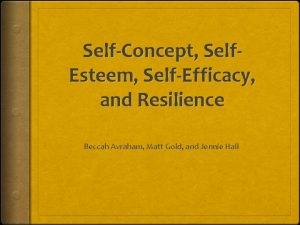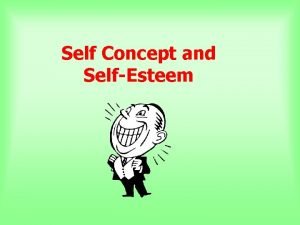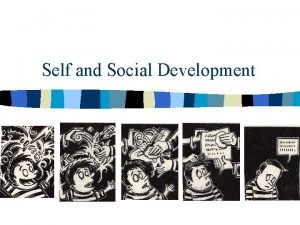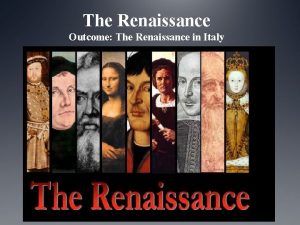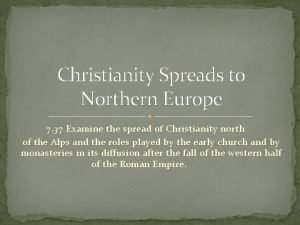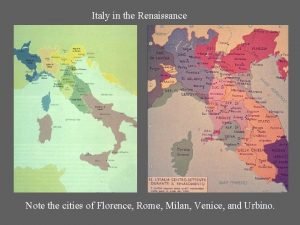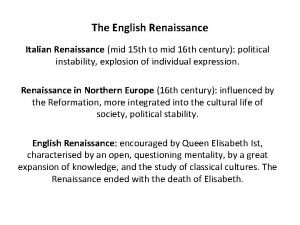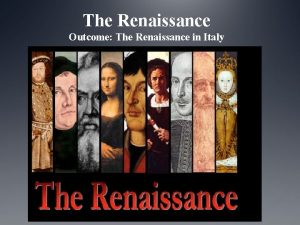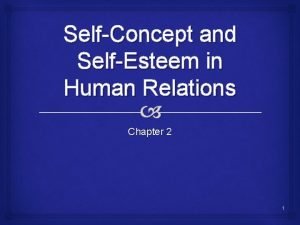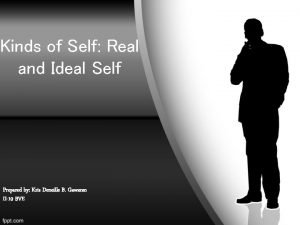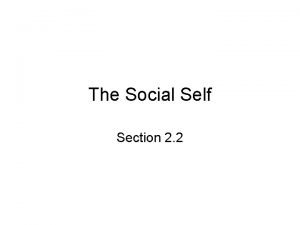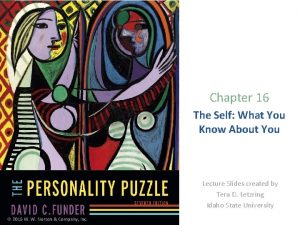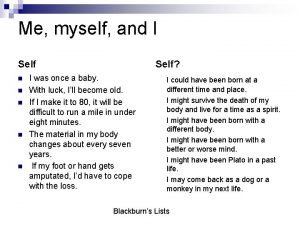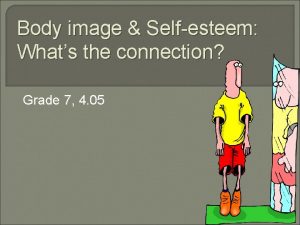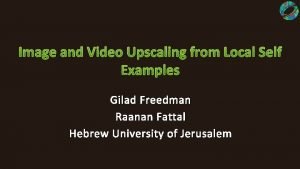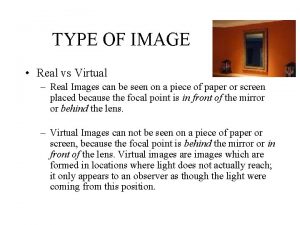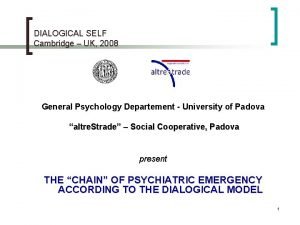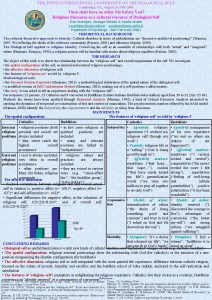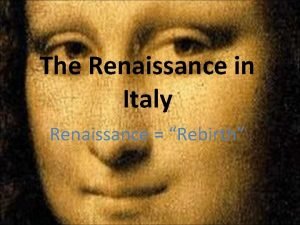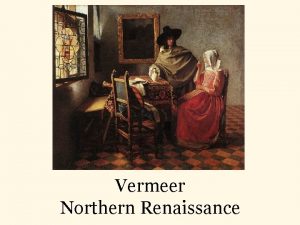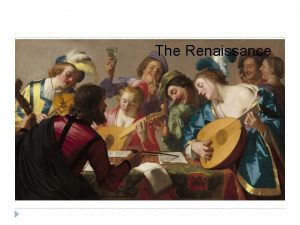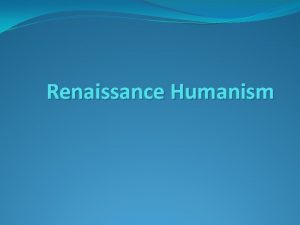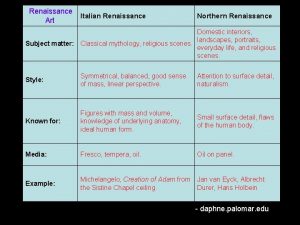Dialogical Image of the Self in the Renaissance

























- Slides: 25

Dialogical Image of the Self in the Renaissance culture: concepts of Steven Greenblatt and Leonid Batkin in a context of the Literary Theory Kochekovskaya Nika (National Research University “Higher School of Economics”, Moscow) MAG Convention “Image of the Self”, Ukrainian Catholic University (Lviv, 27 -29 June 2018) 1

Leonid Batkin (1932 -2016) • “Non-Soviet Medievalists” (“Несоветские медиевисты”) • Problem of translatability… • … is enhanced in the case of Batkin because of his peculiar position in this group… • …but, simultaneously, gives some additional opportunities for working with this problem 2

• New Historicism – opposition to Literary Criticism • Greenblatt suggests a concept of history as a weapon against formal analysis of the literary style and rhetoric in it`s classical philological sense • Instead – history as a problem of historical diversity and as a scholar`s interest to the otherness of another culture • Simultaneously – history is a social sphere, which sheds a new light of the Renaissance literature: not aloof masterpieces by the highbrows, but a crucial part of the self-fashioning Steven Greenblatt (b. 1943) 3

• There is interesting and frequently non-articulated contradiction appearing among these statements: a social sphere with it`s theorists don`t lead here to the “totalization” of theory • Greenblatt frequently applies to the experience of the Annales school and speaks in terms of the history of mentality problematics. However, it became impossible do distinguish the concept of the Renaissance mentality in his texts: Greenblatt uses neologisms “self-fashioning” and “circulation of social energies” which remain quite evasive, performative and literary. • This trait seems to be very interesting for the comparison with Batkin`s approach: we will try to show, that the fruitfulness of this comparison consists in the perspective of Batkin`s conceptual translatability, on the one hand, and of the development the principles and discussions which Greenblatt`s “Renaissance Self-Fashioning” is connected with and shaped by. 4

• Gallaher C. Marxism and the New Historicism // New Historicism. Ed. A. Veeser, 1989. • Lentricchia F. Foucault`s Legacy: A New Historicism? // Ibid. • Gallagher K. Conterhistory and the Anecdote // Gallagher K. , Greenblatt S. Practicing New Historicism, 1997. • Greenblatt S. Sir Walter Ralegh: Renaissance Man and his Roles, 1972: «Ralegh`s self-assertive theatricality … has its intellectual origins in those Renaissance writers who saw in men`s mimetic ability a token of his power to transform nature and fashion his own identity» . 5

• Gallaher K. Conterhistory and the Anecdote… • Anecdotes consciously motivated by an attempt to pry the usual sequences apart from their referents, to use Barthes's terms, might also point toward phenomena that were lying outside the contemporary borders of the discipline of history. . . New historicists deliberately departed from the literary-historical practice of creating embrasures for holding texts inside of established accounts of change and continuity; we used anecdotes instead to chip away at the familiar edifices and make plastered-over cracks appear […] Or, adjusting our metaphor slightly, the anecdote could be conceived as a tool with which to rub literary texts against the grain of received notions about their determinants, revealing the fingerprints of the accidental, suppressed, defeated, uncanny, abjected, or exotic-in short, the nonsurviving-even if only fleetingly. New historicist anecdotes might … provoke new explanations, but these were not taken to be exclusive, uniform, or inevitable 6

…pathos of anecdotalism: the strong desire to preserrve the energies of the anecdote by channeling them into historical explanation, which is followed by frustration and disappointment when the historical project … stifles the very energies that provoked it. Foucault was not just doing counterhistory; he seemed to be living its paradoxes as ·an intense drama that all of us shared whenever we set out, as we constantly did, to capture the animation, the dynamism, of things that were bound to become inert and passive under our disciplinary gaze Michael Dean: «If Foucault does presage a postmodernity, it is neither as a new attitude nor an attitude in favor of the new. . . Nor it is a new periodisation of socio-cultural evolution. Foucault’s postmodernity would be found instead in the restive ‘problematisation’ of what is historically given» [Dean 1994: 55]. Paul Veyne – about Foucault in history: history requires your wonder and explanation much more frequently than it seems; but this explanation is available without a theoretical terminology, only by improvised tools 7

• Roland Barthes, The Pleasure f the Text • I know these are only words, but all the same. . . (I am moved as though these words were uttering a reality). Of all readings, that of tragedy is the most perverse: I take pleasure in hearing myself tell a story whose end I know: I know and I don't know, I act toward myself as though I did not know: I know perfectly Oedipus will be unmasked, that Danton will be guillotined, but all the same (46 -47) • The text is (should be) that uninhibited person who shows his behind to the Political Father (52) • Pleasure <…> as a trivial, unworthy name (who today would call himself a hedonist with a straight face? ), it can embarrass the text's return to morality, to truth: to the morality of truth: it is an oblique, a drag anchor, so to speak, without which theory of the text would revert to a centered system, a philosophy of meaning (63) 8

• An entire minor mythology would have us believe that pleasure (and singularly the pleasure of the text) is a rightist notion. On the right, with the same movement, everything abstract, boring, political, is shoved over to the left and pleasure is kept for oneself: welcome to our side, you who are finally coming to the pleasure of literature! And on the left, because of morality (forgetting Marx's and Brecht's cigars), one suspects and disdains any "residue of hedonism. " On the right, pleasure is championed against intellectuality, the clerisy: the old reactionary myth of heart against head, sensation against reasoning, (warm) "life" against (cold) "abstraction“ … On the left, knowledge, method, commitment, combat, are drawn up against "mere delectation“ (and yet: what if knowledge itself were delicious? ). On both sides, this peculiar idea that pleasure is simple, which is why it is championed or disdained. Pleasure, however, is not an element of the text, it is not a naive residue; it does not depend on a logic of understanding and on sensation; it is a drift, something both revolutionary and asocial, and it cannot be taken over by any collectivity, any mentality, any idiolect (21 -22). 9

• Conterhistory opposes itself not only to dominant narratives, but also to prevailing modes of historical thought and methods of research; hence, when successful, it ceases to be "conter“ (52) • Greenblatt S. Sir Walter Ralegh: The Renaissance Man and His Roles, 1972: • «Ralegh`s self-assertive theatricality … has its intellectual origins in those Renaissance writers who saw in men`s mimetic ability a token of his power to transform nature and fashion his own identity» . • Performativity is contraposed to the uniformity and inevitability – as a more revolutional way in humanitiesd 10

• Roland Barthes, Deux Critiques • Psychologism, or “positivistic psychology” is considered in the context of the literary criticism two paradigms as a “university” criticism, which appeals to the idea of the stability and permanence of writing process as well as to the ideas of the author`s biography and psychology as an explanation theory. The aim of this appeal is an attainment of the verified scale for an attested knowledge. However, Barthes contraposed the second way of criticism to the first one: in this case, literary criticism stems not from the verification and from the positivistic idea of law, but from the criticist`s wonder evoked by the text. This wonder raises from the idea of the historical difference and of anectodial (unreduced to theory or formula) peculiarity of the studied text or subject 11


• Leonid Batkin and his discussion with Aaron Gurewitch (1972) • Цит. по: Баткин Л. М. Европейский человек наедине с собой… • Studies of the Self – “middle” (Gurewitch`s approach directly inspired by Annales and Mark Block) or “highbrows” and “outstanding” persons. Batkin`s method is opposed here to the one of Gurewitch, who looked for an average man and Middle Ages Epoch and tried to distinguish a certain scale of this culture`s categories • The problem of the anecdote rhymes here with later Gurewitch`s criticism against the microhistory: Gurewitch pejoratively attested it`s methodology as “back to the anecdote” 13



• “… Cтранно недорисованные даже для эскизов, эскизные, так сказать, в квадрате!” (232) • “… Bizarrely non-finished, too sketchy even for sketching, so to speak, double-sketching!” (232) • The Pleasure of the Text – in Leonardo drawings; the Self dissipated and submerged in the inner-contradictive and ambiguous process of the authorship 16

Leonardo`s adumbrates: variants of the water streaming 17


• “There is something completely unbelievable! Leonardo wanted to name different figures and motions of the water. And he suddenly adumbrates – in a row – 64 notions: • “Boiling, turning […], revolution, turning, rolling, dipping, floating, falling, uplifting, expiring, drying out, stressing, breaking, falling, sweeping, recoiling, collision, breaking, agitation, jets, effervescence, falling, slowing, twisting, steadiness, rumbles, drone, overflow, overlaps, rush, falls, shakes, whirlpools, coasts, tornadoes, abysses, floods, storms, confusions, stormy landslides, leveling, balance, dragging stones, jerks, foaming, surface waves, impulsiveness, violent, swiftness, merge, slide, stirring, coup, a waterfall” 19



• Foucault M. Fearless Speech • «In parrheria the speaker emphasizes the fact that he is both the subject of the enunciation and the subject of the enunciandum that he himself is the subject of the opinion to which he refers. The specific "speech activity" of the parrhesiastic enunciation thus takes the form: "I am the one who thinks this and that"» (P. 13) • New status of the rhetoric – it`s methodological role and humanistic role as a pleasure of the textual “in-betweenness” 22

• Von Vacano D. The Art of Power: Machiavelli, Nietzsche, and the Makings of Aesthetic Political Theory. 2006. • “Form and content thus are synchronized in the work of the Florentine. Instead of an old quarrel, there is a happy marriage between poetry and philosophy. Reading the poetry, comedy, and “tragic” letters of Machiavelli before reading his better-known political works (The Prince and The Discourses on Livy) offers us a different light on his overall project. • “To give some order to this chaotic sense of the world, Machiavelli and Nietzsche choose to pen their ideas on paper. In this personal decision to write, they choose a style that is not at all one of cold, methodical logic, but rather one peppered with figures of speech, colored with awful scenes, and rife with emotion. Not that they abandon reason; but the reason that is employed is aesthetic, for it is grounded in their firm belief that perception through the senses is what underlies the human condition”. 23

• Kahn V. Virtù and the Example of Agathocles in Machiavelli's Prince // Representations, No. 13 (Winter, 1986), pp. 63 -83. • “…. to dehypostatize virtù, to empty it of any specific meaning. For virtù is not a general rule of behavior that could be applied to a specific situation but rather, like prudence, a faculty of deliberation about particulars” • “In a world where a flexible faculty of judgment is constitutive of virtù, it is not surprising that Machiavelli should offer us no substantive definition of his terms. This is not simply a failing of analytical skill, as Sydney Anglo has complained, but a sophisticated rhetorical strategy, the aim of which is to de stabilize or dehypostatize our conception of political virtue, for only a destabilized virtù can be effective in the destabilized world of political reality. In this context, the most effective critique of an idealist or mimetic notion of truth and of representation will be one that stages or dramatizes this lack of conceptual stability, rather than simply stating it as a fact” • Janara L. Machiavelli, Elizabeth I and the Innovative Historical Self: a Politics of Action, not Identity // History of Political Thought, Vol. 27, No. 3 (Autumn 2006), pp. 455 -485 • “in-betweenness” 24

Thank you! 25
 Ideal self meaning and example
Ideal self meaning and example Self image vs self perception
Self image vs self perception Self concept goals
Self concept goals Self image vs self perception
Self image vs self perception Outcome of renaissance
Outcome of renaissance Italian renaissance vs northern renaissance venn diagram
Italian renaissance vs northern renaissance venn diagram The renaissance outcome renaissance painters/sculptors
The renaissance outcome renaissance painters/sculptors Italian renaissance vs northern renaissance art
Italian renaissance vs northern renaissance art Renaissance vs high renaissance
Renaissance vs high renaissance The renaissance introduction to the renaissance answer key
The renaissance introduction to the renaissance answer key Italian renaissance vs english renaissance
Italian renaissance vs english renaissance The renaissance outcome the renaissance in italy
The renaissance outcome the renaissance in italy All thoughts
All thoughts It is the misalignment of the ideal and real self.
It is the misalignment of the ideal and real self. I self and me self difference
I self and me self difference Contoh ideal self dan real self
Contoh ideal self dan real self Procedural self
Procedural self Self confidence and self awareness eyfs
Self confidence and self awareness eyfs Me myself and i self concept
Me myself and i self concept Exploring self attention for image recognition
Exploring self attention for image recognition Life orientation grade 7 self image
Life orientation grade 7 self image Whats body image
Whats body image Image and video upscaling from local self examples
Image and video upscaling from local self examples Real vs virtual images
Real vs virtual images Virtual vs real image
Virtual vs real image Translate
Translate

